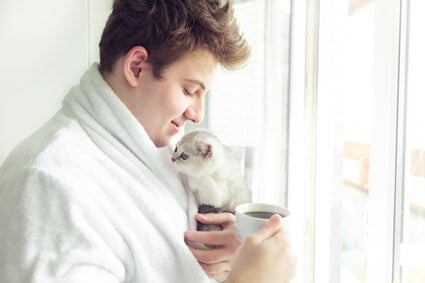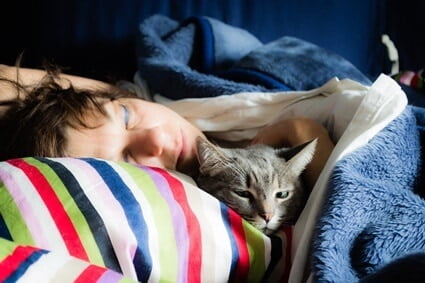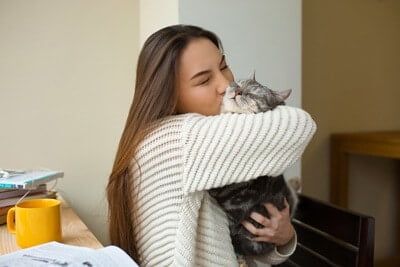Cats use their sense of smell to learn more about the world around them. So, when your cat sniffs your breath, it’s attempting to glean more information about you.
Cats sniff your breath because it’s one of the most unique smells your body produces. Most cats take comfort in their owner’s smell, especially if they’re bonded with them, and use it to distinguish who they are. Cats are also drawn to the warmth and moisture that human breath produces. Hungry cats will sniff your breath to seek out food, particularly if you’ve just eaten meat and fish. Other times, cats are simply being curious.
While more scientific studies are needed, vets theorize that cats can determine when someone has a health condition by smelling their breath. That’s because tumors and canker sores have a more potent scent than healthy mouths, as there are usually signs of decay.
Why Do Cats Smell Peoples Breath?
Not all cats smell their owner’s breath. However, some do, which can seem like a strange and alarming form of behavior for owners that have never experienced this before.
Rest assured that it’s completely normal and can help your cat feel more at ease around you. Nevertheless, these are the primary reasons you cat sniffs your breath:
Primary Smelling Senses
It may seem odd to many people that cats sniff their owner’s breath, but as mentioned, cats rely on their sense of smell as one of their primary senses. While other animals use their eyesight to figure things out, cats gain information through their noses.
According to VCA Hospitals, cats have between 45 to 80 million scent receptors in their noses – and even possibly up to 20 million, making them 14 times more sensitive than ours.
They also use a vomeronasal organ called the Jacobson’s organ to taste the air, identify smells, and commit them to memory. When cats do this, they display the flehmen response, during which they exhibit odd expressions when sniffing the air, such as:
- Open mouth
- Lolling tongue
- Curled upper lip
Don’t be alarmed if you see these behaviors while your cat smells your breath. Your cat’s simply gathering information about you and figuring out what to do with it.
Gauging Their Owner’s Smell
Cats that trust their owners will smell their breath to discover more about them, as breath is one of the most distinctive smells a human can produce.
Your breath harbors tons of useful information that cats can use to identify you with. Therefore, your cat will use the smell of your breath for comfort and will learn to associate the scent with you once it recognizes it.
Warmth and Moisture
Cats enjoy the warmth and moisture human breath produces. In fact, they’re drawn to it. That’s because cats have higher temperatures than humans, as their thermoneutral zone is between 85 to 100 degrees. Lab Animal describes that this is the range at which cats regulate their temperature at.
By smelling your breath, your cat’s also seeking comfort from the warm smell, which many cats also do with other cats and their mothers. This is a soothing experience that cats enjoy.
Hunger
Hungry cats will sniff their owner’s breath if they suspect they’ve recently eaten. We’ve mentioned how a cat’s smell is highly advanced – so much so, they can detect what we’ve eaten through our saliva.
If your pet cat detects food on your breath, it may remain close to you in the hopes of getting something to eat, especially if they smell their favorite foods. This is also a sign your cat needs feeding.
Determining Health Status
According to Oncoscience, cats can pick up the smell of tumors, some diseases, and sicknesses. When cells die, the decomposition process produces foul-smelling toxic diamines, which cats can detect. Tumors located close to the skin’s surface as easier to detect than those buried more deeply.
Many vets believe that unhealthy cells smell more distinctively than healthy ones, so it’s worth paying attention to your cat’s behavior when it sniffs your breath.

Curiosity
Your cat may smell your breath for no other reason than it’s curious. A cat’s curiosity comes from its survival instincts. Curiosity helps cats recognize danger and keep themselves safe. Even though domesticated cats don’t have the same issues as wild ones, this behavior is hardwired within them.
Why Do Cats Inhale Your Breath?
According to Live Science, a common urban legend claims that cats kill infants by inhaling their breath. This comes from the Annual Register published in 1791, which reported the death of an 18-month child caused by a cat sucking its breath.
Fortunately, this urban legend is untrue, but a couple of ideas give it credence. For starters, cats love milk and can smell it on a baby’s breath shortly after feeding. Secondly, cats can become extremely jealous when their owner’s attention is diverted towards a child and not them. Cats don’t intend to smother infants or inhale their breath, but they may accidentally smother them by sitting too close to their face.
As a result, you must take precautions to keep young children safe when you have cats in the house. Never allow your cat unsupervised access around a sleeping child, and keep your cat locked out of its bedroom at all times.
Why Is My Cat Obsessed with My Mouth?
Some cats keep a safe distance from their owner’s mouths, while others won’t hesitate to get close to have a sniff. Many cats give kisses. There are several reasons why your cat may seem obsessed with your mouth, such as:
Grooming Behavior
Many cats enjoy grooming their owners, particularly if they feel bonded with them. Grooming is a sign of affection, so when cats lick their owner’s mouth or face, it’s not an obsession but a sign of genuine love. Your cat’s informing you that it has your best interests at heart and is looking out for you.
Imitation
Cats are natural mimics, which means they commonly imitate human behavior to fit in and learn new skills. If you kiss your partner or children, your cat will pick up on this behavior and do the same to you. Once your cat picks up on a positive response from you, it’ll learn to get close to your mouth time and time again to please you, making it appear as if your pet’s obsessed with it.
Positive Memory Associations
If you shower your cat with kisses, it’ll form positive associations with your mouth and will be keen to relive them as much as possible. Because cats choose when these exchanges take place, it’ll seem as if your cat’s obsessed with your mouth, especially if it sniffs your breath at the same time.
Food Smells
As mentioned, cats that are driven by food will be more obsessed with your mouth than others because of the lingering food smells that come from it. Fish and meat are the most likely foods to inspire an obsession, as these are more appealing to cats than others. Some cats also love the smell of fruit, even if they can’t taste the sweetness.
You can neutralize this curiosity if it becomes a problem by cleaning your teeth or chewing minty gum immediately after eating smelly foods. Your cat will stop getting close to your mouth if it can’t smell what’s on your breath.
Scent Marking
Cats mark their territory to warn other cats that it’s off-limits. Some cats see their owners as theirs and use their scent glands to spread their unique pheromones on what they believe they own.
In some instances, this is their owners. Cats will touch your mouth with their paws and rub their cheeks across your face. This is where their scent glands are located.

Do Cats Check if You’re Breathing?
While it’s not particularly common, some cats check on their owners to see if they’re breathing. This usually occurs at night when people stop moving as much as they do when awake or when their owners decide to sleep in longer than usual. Some cats need reassurance that their owners are okay, so they check that their owners are breathing by:
- Touching them with their paws
- Sitting on their owners to feel their chest move up and down
- Checking the warmth of their breath
- Kneading their body
- Meowing them encourage them to wake up
Alternatively, some cats check on their owners because they want food or attention. As a result, your pet may not be checking on your breathing as such but is attempting to encourage you to get up and see to its needs. If your cat wakes you up frequently throughout the night, you might want to consider shutting your pet out of the room while you sleep.
Why Do Cats Smell Your Breath While You Sleep?
Cats are crepuscular, so it makes sense that they’d smell their owner’s breath once the sun goes down and they settle down to sleep. Some cats do this to check on their owner’s wellbeing, but in most cases, they smell human breath because of the reasons we’ve explained. If your cat feels stressed at night, it will smell your breath to take comfort in the scent and soothe itself.
Similarly, the smell of our breath tends to change throughout the night. After a few hours of sleep, our mouths become dry as the saliva dries up. This allows bacteria to build up, producing a foul-smelling odor. Snorers are more likely to produce a strong smell than those that don’t, which cats can easily pick up on.
Our breath harbors lots of information, so cats take advantage of the fact their owners are don’t move while sleeping to learn more about them during the night.
While it might feel strange to feel your cat sniffing your breath, it doesn’t hurt to allow it. This is an instinctual behavior that cats rely on to learn more about their owners and determine whether they can trust them or not.

